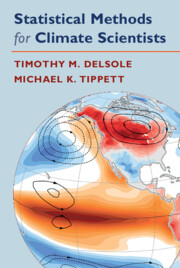Book contents
- Frontmatter
- Contents
- Preface
- 1 Basic Concepts in Probability and Statistics
- 2 Hypothesis Tests
- 3 Confidence Intervals
- 4 Statistical Tests Based on Ranks
- 5 Introduction to Stochastic Processes
- 6 The Power Spectrum
- 7 Introduction to Multivariate Methods
- 8 Linear Regression: Least Squares Estimation
- 9 Linear Regression: Inference
- 10 Model Selection
- 11 Screening: A Pitfall in Statistics
- 12 Principal Component Analysis
- 13 Field Significance
- 14 Multivariate Linear Regression
- 15 Canonical Correlation Analysis
- 16 Covariance Discriminant Analysis
- 17 Analysis of Variance and Predictability
- 18 Predictable Component Analysis
- 19 Extreme Value Theory
- 20 Data Assimilation
- 21 Ensemble Square Root Filters
- Appendix
- References
- Index
6 - The Power Spectrum
Published online by Cambridge University Press: 03 February 2022
- Frontmatter
- Contents
- Preface
- 1 Basic Concepts in Probability and Statistics
- 2 Hypothesis Tests
- 3 Confidence Intervals
- 4 Statistical Tests Based on Ranks
- 5 Introduction to Stochastic Processes
- 6 The Power Spectrum
- 7 Introduction to Multivariate Methods
- 8 Linear Regression: Least Squares Estimation
- 9 Linear Regression: Inference
- 10 Model Selection
- 11 Screening: A Pitfall in Statistics
- 12 Principal Component Analysis
- 13 Field Significance
- 14 Multivariate Linear Regression
- 15 Canonical Correlation Analysis
- 16 Covariance Discriminant Analysis
- 17 Analysis of Variance and Predictability
- 18 Predictable Component Analysis
- 19 Extreme Value Theory
- 20 Data Assimilation
- 21 Ensemble Square Root Filters
- Appendix
- References
- Index
Summary
This chapter introduces the power spectrum. The power spectrum is the Fourier Transform of the autocovariance function, and the autocovariance function is the (inverse) Fourier Transform of the power spectrum. As such, the power spectrum and autocovariance function offer two complementary but mathematically equivalent descriptions of a stochastic process. The power spectrum quantifies how variance is distributed over frequencies and is useful for identifying periodic behavior in time series. The discrete Fourier transform of a time series can be summarized in a periodogram, which provides a starting point for estimating power spectra. Estimation of the power spectrum can be counterintuitive because the uncertainty in periodogram elements does not decrease with increasing sample size. To reduce uncertainty, periodogram estimates are averaged over a frequency interval called the bandwidth. Trends and discontinuities in time series can lead to similar low-frequency structure despite very different temporal characteristics. Spectral analysis provides a particularly insightful way to understand the behavior of linear filters.
- Type
- Chapter
- Information
- Statistical Methods for Climate Scientists , pp. 126 - 155Publisher: Cambridge University PressPrint publication year: 2022
- 1
- Cited by

